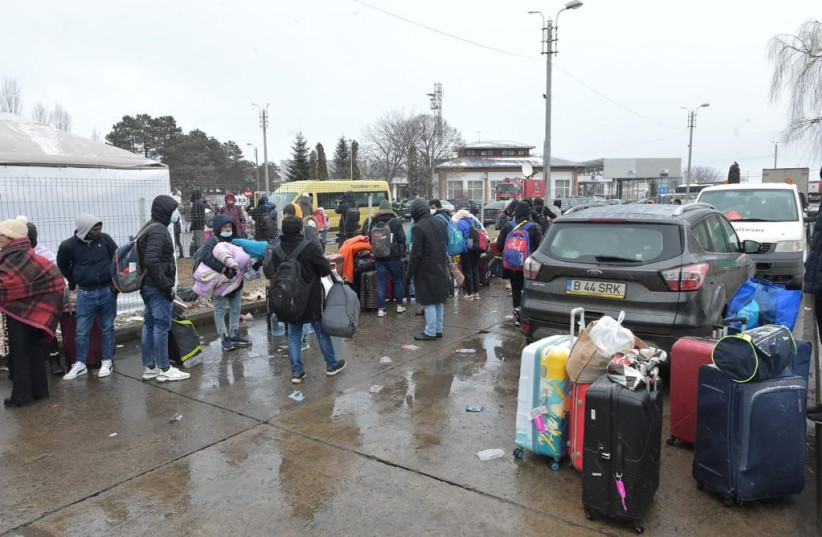During his visit to the Jewish Agency’s refugee reception centers in Warsaw on Monday, Diaspora Affairs Minister Nachman Shai was overwhelmed by the displaced Ukrainian Jews he met. In an interview with The Jerusalem Post, Shai said that meeting the refugees was “fascinating. sad. exciting. frustrating. Everything you would imagine and much more,” Shai said.
“I understood that there are certain things you just can’t understand while in Israel and that you need to see it with your own eyes to believe this can actually be the situation in 2022,” Shai said sadly.
Shai criticized Interior Minister Ayelet Shaked for her wariness in promoting the plan to absorb Ukrainian refugees.
“I don’t understand the panic that struck the decision-makers, especially Shaked,” Shai said, “If you’re a refugee coming out of Ukraine, why would you just randomly go to Israel?
If you go out and a bus is waiting to take you to Hamburg, Germany - I would assume most refugees that have nowhere to go would choose Hamburg over Israel,” Shai said.

Shaked said at the beginning of the week that “Anyone with a brain understands that we cannot continue with such a pace…” regarding the entrance of refugees to Israel, “therefore I intend to set a more balanced policy in the days ahead,” she said.
“At the Novotel hotel in Warsaw, I saw a hall where the Swedish government created a reception center, offering to let any refugee from Ukraine immigrate to the Nordic country.”
Shai: “If a Ukrainian has no Jewish relatives, why would they want to immigrate to Israel? Why do we need to fear that millions will enter Israel,” Shai asks. “In Germany, they are given very good conditions – residence, food and money.”
He explains that refugees “are looking for the closest and most comfortable place to stay in at the moment. European countries are very convenient for them.”
“I think we should accept Jews and those that qualify for our ‘Law of Return’ but also non-Jews. Let’s offer to let them come for a limited time. Don’t worry, they have no reason to stay longer than a few months. I’m not afraid of that. Even if we open our borders, it isn’t realistic for 20,000 non-Jews to come unless Israel takes an organized action.”
After visiting the Novotel Hotel in Warsaw, at the Jewish Agency’s reception center for refugees, Shai said that “I heard heartbreaking stories of people who lost everything within a week. I’m glad Israel can offer them a loving home. I got into conversations with them; I heard how they got out of Ukraine and how they arrived in Poland. I heard from them what they want and need.”
Shai said that everyone he has met with at the agency’s refugee center has a personal and family connection to Israel. “I asked my staff to keep in close touch with these families.”
Now, 80 years after the Holocaust, Shai said that he “is happy” that Jews are being rescued in Poland. “My Grandmother Rosa who lived in Warsaw was not sent to Israel but to Treblinka.” He explained that “I was born 75 years ago, therefore I can understand that the fact that we have a safe home for the Jews - in a Jewish State, is not a given.”
“They are traumatized,” Shai said about the refugees he has met at the refugee center in Warsaw, “We are a people of refugees. The vast majority of us were born in the State of Israel, therefore we have never experienced displacement and immigrating from place to place.”
“I’m going back to Israel as a different person,” he said. “I now understand what our ancestors went through over centuries of history. Our ancestors had to wander from country to country. They would wake up in the morning and suddenly a king or pogromists would start killing Jews. They took what they had and their horses to a new country.
They began a new life, and a few years later had to start wandering again. This is how we have been wandering for thousands of years. It is no coincidence that we were considered to be a people without a country and without a state,” Shai said emotionally.
He added that “Only now, in 2022, do I understand what it means to be a refugee. On my visit at the border, I saw people that were thrown out of their country.”
“The modern-day refugee may be well dressed, but they may not be able to return home anymore. They may not be able to see their relatives again in the coming years.”
He met with representatives of the JDC, the Jewish community in Poland, the Israeli ambassador, Nativ and the Jewish Agency. “At the entrance to the embassy I saw so many people lining up outside, people who needed to get documents standing outside. It was miserably cold,” Shai said.
“I came to Poland because I want to see the whole picture, to understand the distress and think about how the Israeli government can help.”
Shai added that while “We have an argument with Poland,” regarding the Holocaust, “what Poland is doing now is a completely different story... They are investing in people, treating them beautifully and performing a first-rate human act.”
